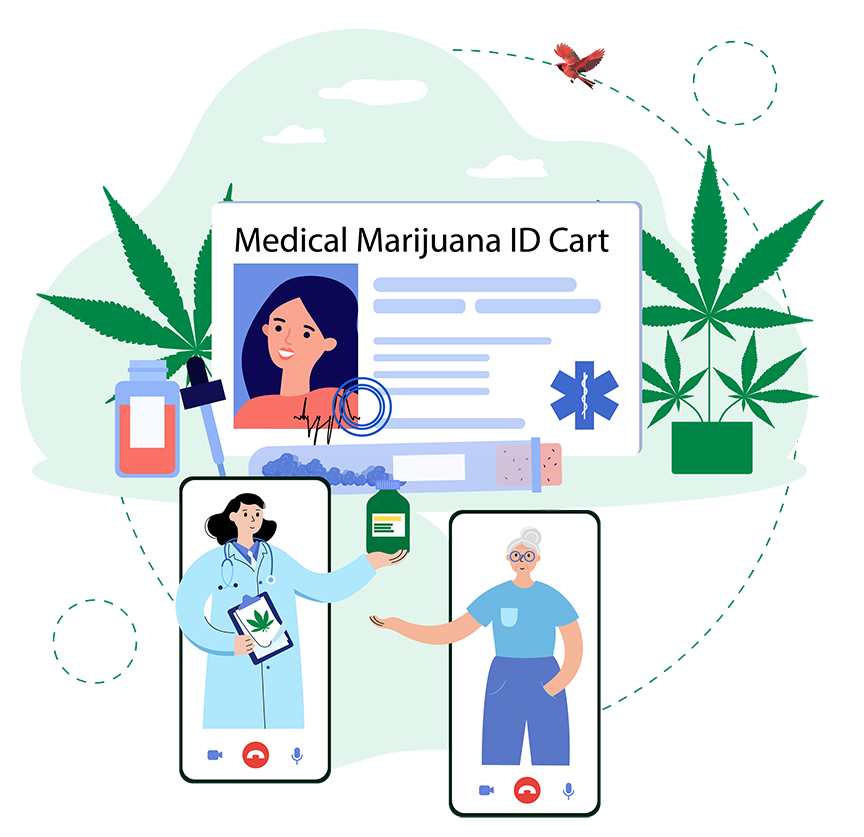Why get a medical marijuana card
It’s legal in Massachusetts to buy in the dispensaries. Why bother with a card? Here are a couple reasons why to get certified:
Under 21 years of age: People can have a MMJ card starting at 18 years of age. At 18 years old, you may find that cannabis is more effective than other products for your condition, however it is illegal under 21 without a MMJ card. If you have cannabis on your person while under 21 years of age and don’t have a MMJ card; you can be subject to illegal possession. Plus, you can more safely purchase cannabis in medical dispensaries and NOT ON THE STREET. Safety first!
Regularly buying a dispensary: If you go to the AU (adult use) or REC (recreational) side of dispensaries to purchase products with some frequency, it probably makes sense to get a MMJ card in Massachusetts. You can save A LOT OF MONEY with a MMJ card!
Here are some of the financial benefits to having a MMJ card:
**Tax Savings** Medical marijuana is not taxed in Massachusetts. Recreational (or Adult Use) dispensaries charge at least 20% tax on marijuana purchases. With a MMJ card, you don’t pay this tax and therefore you save 20% or more on every purchase!
**Patient Discounts** When you are a MMJ patient, you get great discounts above and beyond the prices of what REC or AU people may be allowed. Each medical dispensary in MA offers various patient deals and discounts. Be sure to review their websites!
**NEW Patient Discounts** The first time, sometimes the first several times you go to any medical dispensary as a MMJ card holder, you get compounded discounts that can be upwards of 20, 30, and 50% OFF your purchases. Depending on where and what you purchase, you can get the cost of your MMJ card completely reimbursed just by making your regular purchases. This applies for renewed patients as well.
State Reciprocity: While Massachusetts does not out of state MMJ card holders to use their card in MA, other states DO offer reciprocity to MA MMJ card holders. Some states include: Maine, Arkansas, New Jersey, Montana, Puerto Rico and others. Hopefully this list will continue to grow.
Access to Specialized Products: Most medical dispensaries offer a wider range of products and strains specifically tailored to the needs of patients. These products may be more effective in addressing their conditions, potentially reducing the overall cost of treatment. This may include higher CBD or THC concentrations as well as alternative formulations of cannabis not available on AU or REC side of dispensaries.
Access to Medical Marijuana Delivery Services: Medical marijuana patients may have access to delivery services that cater specifically to patients, potentially saving time and transportation costs. This may also be the only way some people could access dispensary cannabis without a caregiver.
Purchase Limits: Medical marijuana patients are typically given an allotment of 10 ounces in a 60 day period, predetermined by the Commission. Under certain conditions, this allotment may be changed by the MMJ Certifying Provider.
Home Cultivation (growing): In Massachusetts, each medical marijuana patient can have 12 plants in vegetation and 12 plants in flower whereas a NON-patient over 21 years of age, can legally only have 6 plants total in Massachusetts at one time. Therefore, each MMJ patient in a household can legally have more than 4x the number of plants allowed otherwise.
* It’s important to note that medical marijuana laws and regulations can change, so it’s advisable to stay informed about the latest developments in Massachusetts’ medical marijuana program. FlowerMedical is not responsible for any changes or policy issues that may be personally problematic.


Why NOT get a Medical Marijuana card?
Not every person should run out and get certified for MMJ. Here are some reasons to reconsider getting certified for a MMJ card.
Pregnant or Breastfeeding: In general, if you are planning to become pregnant you should not use cannabis. In fact, if you are NOT actively trying to prevent pregnancy, you should probably reconsider a card. The card is typically renewed annually thus your card would likely expire at some point during your pregnancy (and/or breastfeeding time) and then it is no longer a smart financial decision. Like any medication or consumable, cannabis during pregnancy or breastfeeding may alter the best outcome and should be avoided.
Not a regular cannabis consumer: If you are not sure if cannabis will be a good fit for you, it might be too soon to consider a MMJ card. You can purchase products from dispensaries that may be worth trying for some time before investing the time and money to get a MMJ card. You can consult with FlowerMedical to see if it is a good fit for you before getting certified.
Legal Restrictions: Medical marijuana laws vary by country, state, and jurisdiction. It is still illegal at the federal level and there can be legal consequences for obtaining and using medical marijuana, even with a card. People with concerns about the legal implications may choose not to get a medical marijuana card. It cannot be touted as a “get out of jail free card” as it often is not.
Medical Incompatibility: Not all medical conditions are effectively treated with medical marijuana. If a person’s medical condition doesn’t respond well to cannabis-based treatments or otherwise conflicts with current practices, it might not be a suitable option for you.
Employment Concerns: Jobs that involve safety-sensitive positions or have strict drug testing policies may be incompatible with medical marijuana use. Some employers may have zero-tolerance drug policies, and having a medical marijuana card may not protect someone from disciplinary actions in the workplace.
Potential Side Effects: While many people experience positive effects from medical marijuana, some individuals may experience unwanted side effects or adverse reactions. It’s important to consider potential side effects before pursuing a card. It’s essential to consult with a healthcare professional to determine if medical marijuana is appropriate for your specific condition and symptoms. Transparency with your PCP is really important as well.
Lack of Medical Need: A medical marijuana card is intended for individuals with qualifying medical conditions that can be alleviated or managed with cannabis-based treatments. If someone does not have a genuine medical need, they should not seek a medical marijuana card.
Alternative Treatments: There may be alternative treatments or medications available that are more suitable or effective for a particular medical condition. It’s important to explore all available options before deciding to pursue a medical marijuana card.
Privacy Concerns: In some regions, registering for a medical marijuana card may create a record of cannabis use, which could potentially impact someone’s privacy or future opportunities. Some individuals may prefer to avoid such records.
Stigma: Some people still face stigma and discrimination associated with medical marijuana use. This can impact a person’s decision to get a medical marijuana card, however we hope that FlowerMedical will help support you through this challenge.
* It’s important to note that medical marijuana laws and regulations can change, so it’s advisable to stay informed about the latest developments in Massachusetts’ medical marijuana program. FlowerMedical is not responsible for any changes or policy issues that may be personally problematic.
